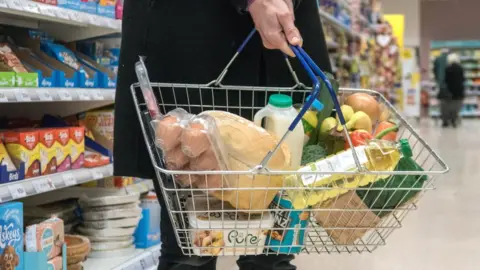Retail sales jump in April driven by cigarettes and alcohol
 Getty Images
Getty ImagesSales of alcohol and tobacco were the main driver behind a surprise rise in overall UK retail sales in April.
Despite the rising cost of living hitting household budgets, sales volumes jumped 1.4% last month, following a fall of 1.2% in March.
However, official figures revealed a longer downward trend of sales overall.
The Office for National Statistics said off-licences saw a boost in sales last month, which it suggested meant people were staying in to save money.
Danni Hewson, a financial analyst for AJ Bell, said the "big uptick" in food and drink spending in supermarkets "might indicate that people are choosing their kitchen tables over pubs and restaurants as they look to save money".
"Whilst food spend has been largely unchanged, which suggests people are still being cautious, spend on alcohol and tobacco has soared," she added.
"Life's little luxuries... will have to come in under budget as those budgets are tested."
Experts had expected sales in April to fall further as consumers cut back in the face of rising living costs.
Earlier this week, the latest official figures showed inflation, the rate at which prices rise, hit 9% in the 12 months to April - the highest rate for 40 years.
April saw the first impact of the latest jump in energy costs, with millions of people facing an unprecedented £700-a-year increase in bills.
However, prices have been rising for months, as fuel, energy and food prices surge higher due to the pandemic and the Ukraine war, while wages have been failing to keep pace. The rate of inflation is expected to continue to rise this year.
The ONS has previously said that people had begun to cut back on spending and use their cars less due to record petrol and diesel prices.
Over the three months to the end of April, sales overall edged down by 0.3%, which revealed a longer downward trend, the ONS said.

However, while sales volumes at non-food stores were down in April, online sales rose by 3.7% and the proportion of retail sales online remained substantially higher than pre-pandemic levels, said Heather Bovill of the ONS.
"Clothing sales had a strong month especially online, with some retailers suggesting consumers were purchasing clothes for summer holidays and weddings," she said.
AJ Bell's Ms Hewson said summer would be the time for "postponed events and much anticipated holidays".
"After a couple of years where only the top half was visible to most of the world people are updating their wardrobes," she added.
But she warned the boost might be short-lived, saying: "People can only spend a pound once and when that pound is worth significantly less than a year ago people have to make choices."
Surveys also suggest consumer confidence has taken a hit. The long-running GfK consumer confidence index fell by two points in May to -40, the lowest score since the survey began in 1974.
GfK's Joe Staton said May's result was one point lower than the previous record set in July 2008.
"This means consumer confidence is now weaker than in the darkest days of the global banking crisis, the impact of Brexit on the economy, or the Covid shutdown," he said.
 Getty Images
Getty ImagesHowever, Nicholas Farr, assistant economist at Capital Economics, said April's rise in retail sales suggested the higher cost of living had not caused consumer spending to collapse and meant "the economy may have a little more momentum than we thought".
He added that rising inflation could not be solved without the Bank of England having to increase interest rates further.
The Bank's response to rising prices has been to raise interest rates to try and cool them. The idea is that when borrowing is more expensive, people will have less money to spend which dampens demand.
However, it has has faced criticism from MPs for not doing enough to tackle the crisis. This week Bank governor Andrew Bailey defended its response, insisting inflation was being driven by global forces that limited what the Bank could do.
